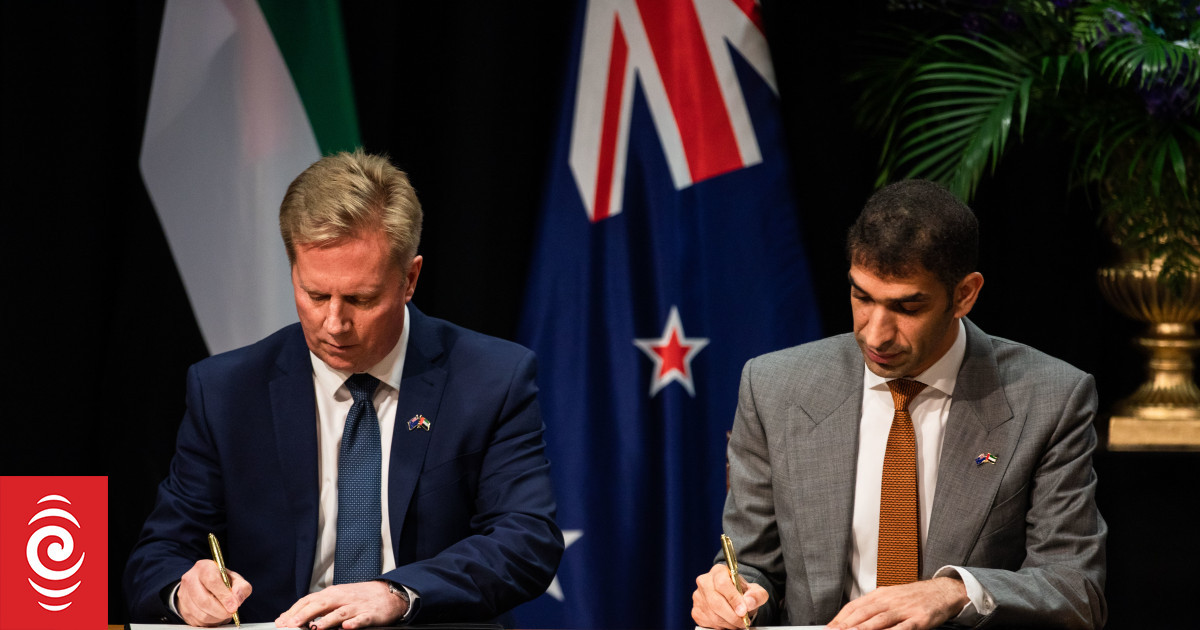New Zealand has signed a free-trade deal with the United Arab Emirates – the fastest agreement the country has ever struck.
The deal lifts duties on 98.5 percent of New Zealand’s exports immediately on entry into force, rising to 99 percent within three years.
Aotearoa exports amount to more than $1 billion across the dairy, red meat, industrial products, horticulture and tourism sectors.
Trade Minister Todd McClay announced the deal with his UAE counterpart Minister of State for Foreign Trade Dr Thani bin Ahmed Al Zeyoudi in Wellington on Thursday morning.
He said the UAE was one of New Zealand’s most important trading partners in the Gulf region and today’s deal would boost Kiwi exports and strengthen supply chains.
“This will create new opportunities for New Zealand businesses in the dynamic UAE market, contributing to our ambitious target of doubling exports by value in ten years.”

Trade Minister Todd McCay.
Photo: RNZ / Samuel Rillstone
Al Zeyoudi said New Zealand was a long-standing and highly valued trade partner of the UAE.
“The Comprehensive Economic Partnership Agreement will further strengthen our bilateral relations and boost private-sector opportunity in both nations.
“The conclusion of our CEPA is also an important step forward in realizing our shared ambition to secure long-term prosperity for our peoples and nations alike.”
The new trade deal was struck just four months after negotiations first began in May.
Two-way trade with the UAE, one of New Zealand’s top 20 export markets, is valued at $1.3b a year.

Trade Minister Todd McCay and his UAE counterpart Minister of State for Foreign Trade Dr Thani bin Ahmed Al Zeyoudi.
Photo: RNZ / Samuel Rillstone
New Zealand International Business Forum executive director Stephen Jacobi said the deal was a real shot in the arm for exporters.
“This is a very a good announcement and the government is to be commended for getting this over the line after only four months, it’s unprecedented.
“This deal gives us a launching pad for trade into the Middle East, the market is already pretty open but what we are looking for out of this are the dynamic gains of trade, the bigger picture about all of this is that exporters, particularly in the agribusiness space, have been having a really difficult time and this gives them some new opportunities and options to build their overseas connections.”
Jacobi said the FTA would not replace New Zealand’s significant trade with China, but the tough times of the last year showed why diversification was important.
“It’s always good for exporters to have options and to build markets all around the world, we need a broad sweep of markets to ensure our industries can reach their full potential.
“This is a wealthy market and they want to buy the products we have to sell.”
Primary Industries welcome deal
The Dairy Companies Association of New Zealand said the deal would deliver the complete elimination of all dairy tariffs from day one.
Executive director Kimberly Crewther said New Zealand exported approximately NZ$700 million worth of dairy products to the UAE in the last year, making it our 10th largest dairy market.
“Eliminating all dairy products provides important certainty to continue growing this trade.
“”The UAE agreement is a positive step towards a less protectionist international environment for New Zealand dairy products. We strongly encourage the government to continue pursuing such high-quality outcomes with other negotiating partners, including upgrading existing trade agreements that have not yet secured dairy tariff elimination.”
The honey sector is happy with the deal as it removes a 5 percent tariff on New Zealand honey.
Apiculture New Zealand chief executive Karin Kos said honey exports to the UAE were worth $5.3m in the year to June and demand was growing.
“This will make doing business easier for exporters at a time when it is much needed by the New Zealand honey sector.
“New Zealand honey exporters will look forward to the benefits of closer trade ties including more opportunities to present the benefits of New Zealand’s unique honey offerings.”
Federated Farmers said the deal would take millions of dollars that would have been charged in tariffs and pump them directly into rural communities.
President Wayne Langford said it was great to see the government delivering on their commitment to open up new markets, reduce tariffs, and give our exporters options.
“The Middle East presents an exciting opportunity for Kiwi exporters as a wealthy and growing market with huge potential.”
He said the deal was a boost for farmers who had been doing it pretty tough lately with high costs and squeezed profit margins.
“As a country we earn a living producing high quality food and fibre and selling it to the rest of the world, but we’re currently operating in a tough international environment.
“Farmers will gladly welcome any moves to reduce our costs, grow our incomes, or increase our competitiveness in the global marketplace.”

